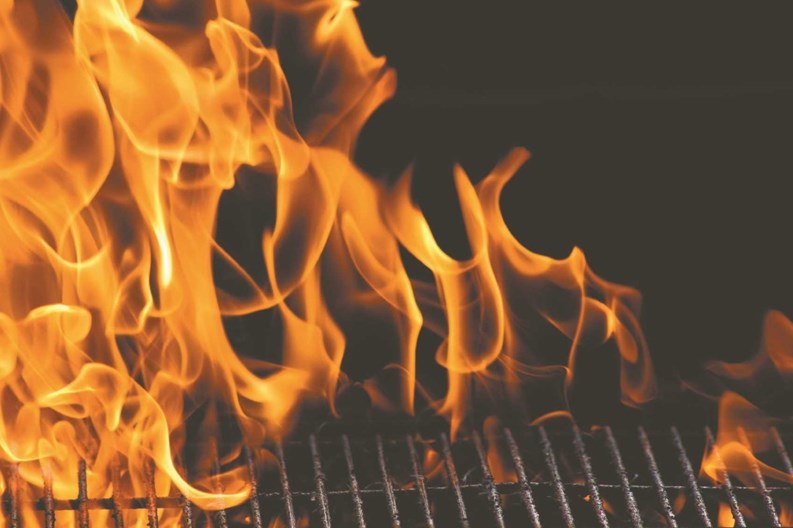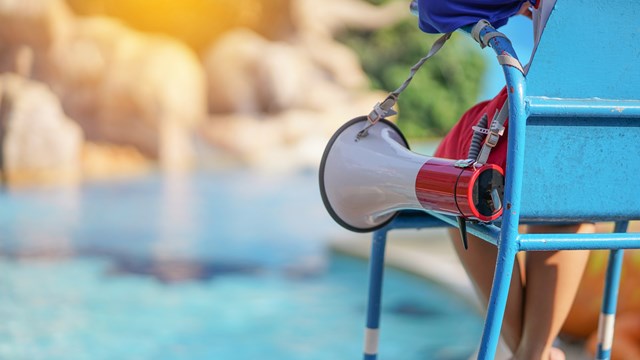Ah, summertime. It’s a great time for property managers to kick back and relax -- except for that out-of-control grill fire on the deck of unit 31 that nearly spread to adjacent units; that ornery 13-year-old who broke his finger during horseplay in the community swimming pool, and the swarms of bloodthirsty mosquitoes congregating around the drainage ditches along the perimeter of the property.
Actually, maybe summertime isn’t the best time for condo managers to let down their guard. With the increased outdoor activity encouraged by the warm weather is the increased potential for injuries on an HOA’s property, as well as the need for additional safety measures. To get though the summer without serious mishap, experts recommend a thorough, multifaceted approach to safety at every HOA, regardless of size or number of amenities.
Swimming Pools
While a swimming pool is without question an extremely valuable and sought-after amenity for just about any HOA, the pool itself and the surrounding area can be the site of injuries -- or even tragedy -- if strict safety protocols are not enforced.
Swimming pools are covered under the New Jersey State Bathing Code, which exists to promote safe swimming for everyone and for children in particular. The code covers a great deal of ground, but some of the more noteworthy items include rules requiring fencing around pool areas to control access and lessen the chance of an unattended children falling in, rules requiring ladders and proper filtration systems. Managers must also be aware of new compliance regulations as a result of the Virginia Graeme Baker Pool & Spa Safety Act, which now requires that all pools and spas to be equipped with proper drain covers and subsequent devices and systems designed to prevent entrapment by pool or spa drains.
Lifeguards are an HOA's first and best line of defense when it comes to avoiding pool-related accidents. With certain exceptions, most HOAs are required to have a trained lifeguard in the pool area during its hours of operation.
However aside from the legal requirements, having a lifeguard on staff pays off in other ways. In addition to preventing drowning and enforcing pool rules, lifeguards can also act as gatekeepers to prevent non-residents from accessing private HOA pools. By controlling access to the facility, lifeguards can help reduce the chances for vandalism or theft of pool equipment and furniture.
During off hours, when lifeguards aren’t present and the pool is locked down, a higher fence—six or eight feet compared to the standard four feet—can lower insurance premiums and keep kids from midnight swims.
In addition to the need for supervision as a preventative measure and to promote overall safety, there are also a number of prohibited items that should be banned from HOA pool facilities-- among which, foremost, are diving boards and alcohol. Diving boards may be popular fixtures at municipal pools, but in an HOA's pool area they are a high risk for potential injuries.
Alcoholic beverages also increase the chance for injuries and other libilities such as heat stroke or delinquent behavior.
"There's a 50 percent increase in the chance of a lawsuit if diving boards or alcohol are allowed [in a pool area]," says Trevor Sherwood, the owner of Pool Operation Management in Brick."You get cheaper insurance rates if those two things [diving boards and alcohol] aren't permitted." In other words, don't drink or dive. The only place you see diving boards nowadays are at community swim clubs," he says.
Aside from lifeguards and fencing, an HOA's pool should be equipped with a few other vital pieces of hardware, including a dedicated landline telephone to make emergency phone calls, says Dr. Richard Bradley, a member of the American Red Cross Advisory Council on First Aid, Aquatics, Safety and Preparedness. To depend on a cell phone for emergency calls is not a good option, as coverage may not be 100 percent reliable, and many residents do not bring their phones poolside, says Bradley.
Other essential items include a Red Cross-approved first aid kit, a blanket, cold compresses and a spinal backboard for transporting swimmers with injuries, he says.
Bradley also notes that pool rules should be clearly posted and enforced. He stresses that no one should ever swim alone. Educating unit owners about pool safety and rule enforcement is extremely important and can be achieved through newsletters, notices and prominent signs.
Insect-borne Illness
For New Jersey condo-dwellers, serious insect-borne illness generally comes from one of two sources: mosquitoes and/or ticks. Mosquito bites can lead to either Western Nile Virus or Eastern Equine Encephalitis infections, while tick bites can lead to Lyme Disease.
Mosquitoes breed and lay their eggs in stagnant water, so the key to minimizing this hazard is cutting off their breeding cycle, says Bradley. “You’re looking for places where there is standing water and eliminating it.”
The condo's management, Bradley says, should instruct unit owners to clear all junk off their porches – rainwater can accumulate in and around items like old tires and buckets and serve as breeding areas for mosquitoes. Once that’s dealt with, a community can then turn its attention to common areas, filling in natural depressions -- as well as those formed by tire-tracks and other resident activities -- that collect rainwater or moisture from the irrigation system. Retention basins can easily become oversized mosquito breeding grounds and should be treated by a professional pest company with chemicals to reduce mosquito larvae, says Bradley.
Ticks that cause Lyme disease can be found alongside the walking trails that are so popular at many New Jersey condominiums. To minimize danger, condos should cut back bushes and brush so that ticks cannot jump on to residents when they brush against them. If residents do happen to come into contact with cut-back brush, Bradley strongly recommends that owners inspect themselves and their pets for ticks when they get back inside.
Cookouts and Fires
While grilling and socializing with friends and neighbors is a summer highlight, outdoor cooking presents the potential for more disasters than just overcooked ribs or burned hotdogs.
To minimize the danger of cooking fires, Bradley says grilling should only be allowed in designated areas away from residential buildings. He also stresses that grilling areas should be open and well-ventilated. Semi-enclosed areas can trap carbon monoxide from cooking and lead to illness or even death, so it’s vital to have adequate air circulation in and around grilling areas.
Water Hose Breaks
One of the chief causes of property damage during the summertime are burst washing machine hoses, say to Sarah Friedman, director of marketing with disaster restoration firm ServiceMaster by Gilmore Brothers in Framingham, Massachusetts. “We see a tremendous number of washer hose breaks in the summer,” says Friedman. “If you’re there [during a hose break] and jump right on it, it’s not much of an issue. But if you’re out at the beach for a day or on vacation for a week, that's when your [broken] washer hose runs for a few days. Then you’re really in trouble.”
To keep water from causing severe damage to multiple units, Friedman says the condo's management should instruct owners to install burst-resistant steel hoses along with shut-off valves, which need to be in the off position when not doing laundry.
Management can arrange to have both installed and can post reminders in summer newsletters to use the shut-off valves, says Friedman. “They need to shut off the valve whenever they’re not using the washing machine,” she says.
Staff Training
When the inevitable summertime accident does happen, Bradley says condos can be prepared in a number of ways. Having a Red Cross-approved first aid kit, with a blanket and cold compresses, is the start to being prepared, he says. Larger condos are now also starting to stock Automated External Defibrillators (AEDs), which can restart a heart stopped by a heart attack, says Bradley. “If it’s a bigger facility, they may want to consider purchasing an AED and keeping it centrally located,” he says. The AED will ideally be located in a publicly-accessible place secured in a cabinet with an alarm which sounds when opened.
Communities concerned about the potential for liabilities which could arise for providing or utilizing an AED needn't be worried, says Bradley. “These devices are becoming so commonplace, I would be concerned that there would be liability if they didn’t have one, or didn’t use it,” says Bradley. As AEDs are so easy to use and heavily-tested, Bradley says, “these devices are extremely safe. They have almost no possibility of causing harm. So the only thing they can do is save a life, where otherwise a life would be lost.”
Training in first aid and CPR is highly recommended, especially for on-site staff, says Bradley. The site staff “become the front line that the tenants are going to look to when an emergency occurs,” he says.
To be prepared, Bradley recommends that managers and staff take courses in First Aid, CPR, and AED and get certified to perform those procedures. Inexpensive courses are available through the Red Cross in virtually every town in New England, says Bradley.
“Red Cross training is the common thread in all of this. It gives management the skill and the confidence to act in an emergency,” says Bradley.
And when an emergency occurs at the condominium, a little preparation goes a long way.
Jim Douglass is the managing editor of New England Condominium magazine, a Yale Robbins' publication.







Leave a Comment